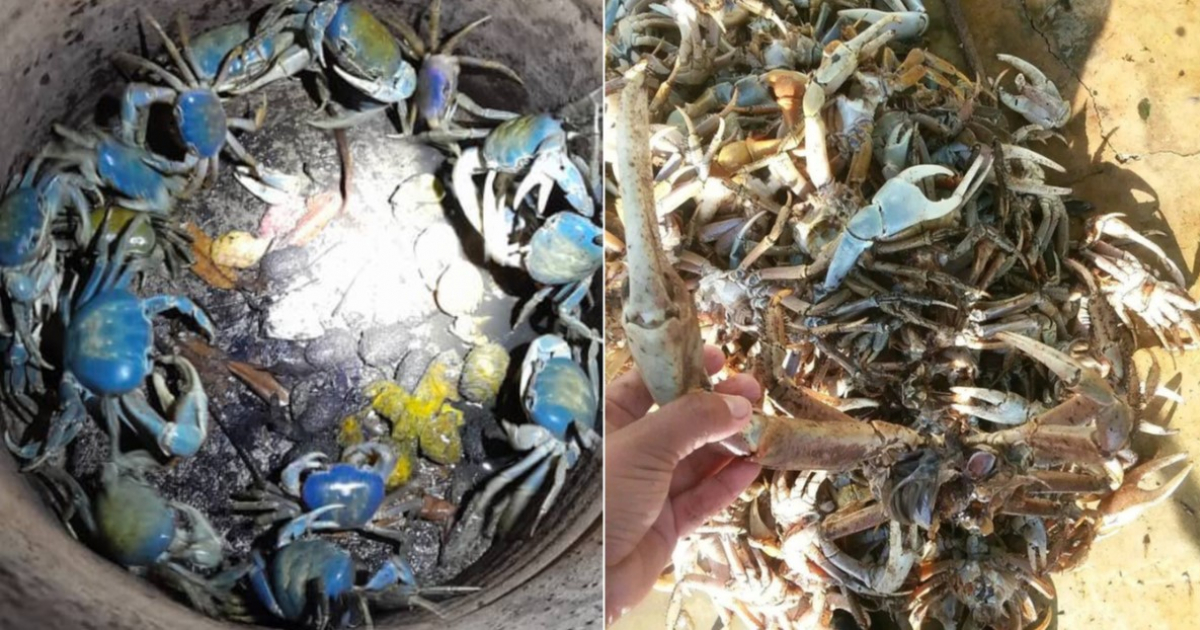The food crisis in Guantánamo, worsened by the poor management of the Cuban regime, has forced residents to seek alternative means of sustenance, endangering the blue crab population in the Imías municipality due to the overexploitation of this local natural resource.
The Food Monitor Program (FMP) reported on Thursday that the overharvesting of blue crabs in Imías is inextricably linked to the broader context of the food crisis in Cuba, affecting the entire population. The FMP highlighted that the overexploitation of the blue crab in Imías is a direct result of failed economic and agricultural policies, which have led to an excessive dependence on imports, inefficient distribution, and prohibitively high food costs. This situation forces many families to seek more affordable and accessible alternatives.
This situation has led to the unsustainable overharvesting of crabs, a practice that is necessary for those who cannot afford to buy food in the market, according to the cited source. In the Imías municipality, the hunting of blue crabs is a crucial activity that blends tradition and modernity but faces significant challenges that threaten both the sustainability of the species and the food security of the region.
FMP noted that the introduction of artificial light sources has revolutionized crab hunting, making it easier for anyone to catch them both day and night. "The ease with which these animals can now be located and caught has endangered the species' sustainability and disrupted the ecological balance of the mangroves," they stated.
Several residents of this locality in eastern Cuba have confirmed this reality, noting that currently, both skilled and inexperienced individuals can bring home a large catch, something that only a few could achieve before. "One does not hunt crabs for the love of it; it's out of necessity, and in the end, if I don't catch this, I won't have food," one of them pointed out.
The absence of blue crabs in Imías, besides indicating serious issues in the mangrove ecosystem balance, reflects a larger problem faced by the Cuban people: how to balance the population's food needs with nature conservation. "The overexploitation of natural resources is a recurring problem in various regions of the country, where the need for subsistence clashes with the urgency of conservation," FMP noted.
This is just one of the many manifestations of the worsening economic crisis in Cuba, which has led the population to adopt non-traditional eating practices. The increase in hunting dogs and cats for human consumption has alarmed animal advocates who have pointed out the lack of pet protection in a country with lax anti-cruelty laws.
The multimedia platform El Toque published an extensive journalistic piece showing how the consumption of cats has increased in the province of Guantánamo. "The normalization of these events has raised concerns, especially among the animal protection societies in the province and pet owners," the website noted, warning that some people fear for their pets' lives and prefer to keep them indoors for protection.
In this regard, the article cited Mayte, a member of Bienestar Animal Cuba (BAC), who explained that she does not let her cats go outside because she fears they will be stolen, and prefers to keep them safe inside the house, a measure she assured is the only one that has kept pets safe in Guantánamo so far.
The promotion of cat meat sales on social media, along with the lack of action from legal and health authorities, has generated outrage and concern both within this animal protection group and among other residents of the province.
Understanding the Blue Crab Crisis in Guantánamo
The food crisis in Guantánamo has created a dire situation for the blue crab population. Here are some frequently asked questions to help understand the issue better.
Why is the blue crab population in Guantánamo at risk?
The blue crab population is at risk due to overexploitation caused by the food crisis, which forces residents to hunt crabs for sustenance because of failed economic and agricultural policies.
How has artificial lighting affected blue crab hunting in Imías?
Artificial lighting has made it easier to locate and capture blue crabs both during the day and night, leading to an increase in overharvesting and endangering the sustainability of the species.
What broader issues does the blue crab crisis in Guantánamo reflect?
The blue crab crisis reflects the larger issue of balancing the Cuban population's food needs with the conservation of natural resources. It also highlights the recurring problem of overexploitation of natural resources in the country.
What other non-traditional eating practices have emerged due to Cuba's economic crisis?
The economic crisis has led to an increase in hunting dogs and cats for human consumption, alarming animal advocates due to the lack of pet protection in the country.
